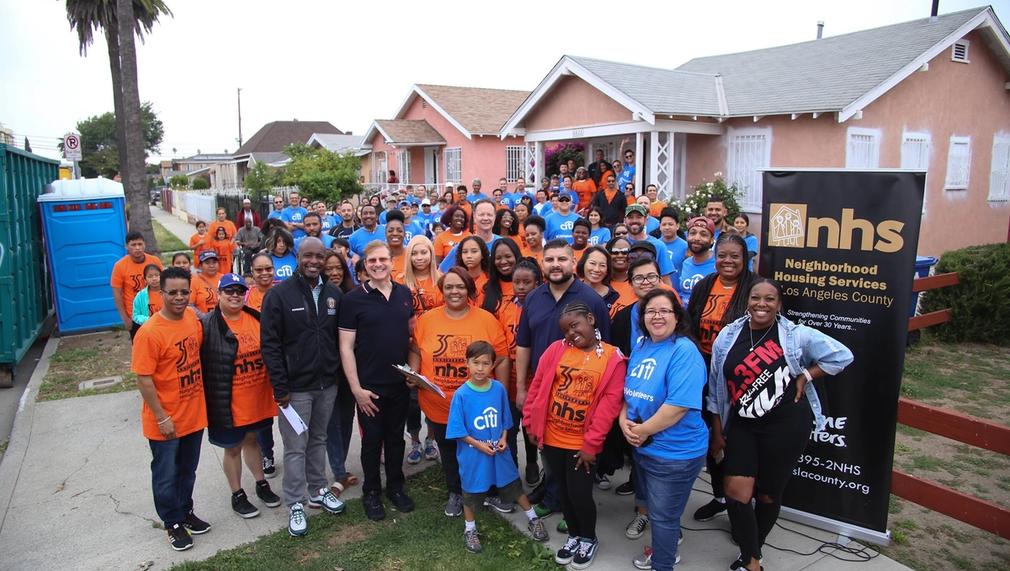The Legacy Project: Building Generational Wealth
NHS’ Legacy Project provides financial education, estate planning & counseling, wealth building strategies, property supports through affordable loans and property acquisitions, and works to preserve cultural neighborhoods. This project is essential to helping LMI and BIPOC communities break socio-economic barriers through financial literacy education, homeownership opportunities, and neighborhood revitalization.

What is the primary issue area that your application will impact?
Income inequality
In what stage of innovation is this project, program, or initiative?
Expand existing project, program, or initiative (expanding and continuing ongoing, successful work)
What is your understanding of the issue that you are seeking to address?
The wealth gap has devastating effects on the well-being of BIPOC families, affecting intergenerational legacy and upward mobility. With roughly 2/3 of total wealth accumulated by the typical US homeowner linked to a primary residence, homeownership has proven itself to be a stabilizing force. A home provides safety, a stable source of income and value that can be passed on to future generations. However, systemic discriminatory practices such as institutional racism, exclusion from lending, lack of resources and other equity barriers have made homeownership an uphill battle for lower-income individuals and BIPOC communities. According to the California Housing Finance Agency, while 65% of Californian homeowners are White only 46% are Latinx, 45% are Indigenous, 45% are Pacific Islander, and 36% are Black. The large discrepancies in ownership rates highlight the barriers that diverse communities and racial groups face when it comes to building a legacy of generational wealth.
Describe the project, program, or initiative this grant will support to address the issue.
NHS provides BIPOC families with financial education and counseling, access to wealth building strategies, and property support through affordable loans and property acquisitions. The Legacy Project includes the following components:
• Educational programming – NHS provides tenant, homebuyer and homeowner counseling, foreclosure prevention and small business training, and life and estate planning. We also provide technical training and financial support to local small business owners to retain their business and preserve jobs.
• Legacy Fund – expansion of NHS’ down payment and closing cost assistance resources to include grants, deferred and low-cost funding to cover ‘gaps’ associated with buying or refinancing a home or making repairs. The Fund can also be used to provide grants to local businessowners in order to keep local businesses operating in the community.
• Legacy Talks –informative events and podcasts that provide opportunity for national and local experts to offer insight on wealth building, housing and homeownership, small business, media communications, mortgage strategy, investing, health and other urgent matters impacting families.
• Legacy Summit – a training resource and convening of thought leaders and community partners to expand cultural conversations, build networks and connect the community to on-the-ground programming and the core work surrounding policy reform
Describe how Los Angeles County will be different if your work is successful.
NHS’s Legacy Project is critical to helping families of color build wealth and legacy. Wealth provides for economic security and builds intergenerational wealth, allowing families to pass down assets to future generations, invest in higher education, purchase a home, or provide money for starting a business.
In 2024-25, NHS anticipates completing 3 additional Legacy Summits and 4 additional Legacy Legal Days, 500 additional Counseling sessions, 150 down payment and asset protection grants, 200 additional estate plans, and increase reach to 500 additional households. Over the next three years, we plan to directly invest over $1.1 billion into our Legacy Project focused work. Investments will include: $216M to purchase/rehabilitate 180 homes, facilitate 240 ADU projects through redevelopment and affordable lending programs, reinvest $540M into assisting 1,000 BIPOC and LMI families into becoming homeowners, and 240 minority-owned businesses to start, grow and maintain their businesses.
What evidence do you have that this project, program, or initiative is or will be successful, and how will you define and measure success?
Evaluation of NHS’s overall counseling program performance is generated through a client management system’s reporting tool, which provides the organization with the following: • % of clients moving from FL and FC into other modules, including estate planning, homeownership and post-purchase
• Increase Number of FL and FC sessions held by 100% • Increase Number of Down Payment and Asset Protection grants awarded to clients by 60%
• Increase Number of clients who attend the Legacy Summit by 225% •Increase Number of clients that sign up for estate planning, successfully complete an estate plan within 60-day timeframe, and tracking and evaluation after completion by 62%
• Number of properties saved through critical home maintenance upgrades, refinancing, ADU supports to expand family income and preserve legacy will exceed 500
• Save and retain up to $400M in home values in the community
• Increase Number of small businesses owners receiving TA and financial assistance by 4
Approximately how many people will be impacted by this project, program, or initiative?
Direct Impact: 6,000.0
Indirect Impact: 2,600,000.0